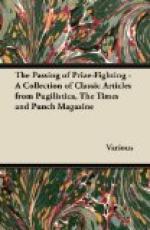“Hooray,” said Chum, wriggling all over, “isn’t this splendid? I say, which way are you going? I’m going this way?... No, I mean the other way.”
Somebody had left some of his milk-cans on the platform. Three times we went round one in opposite directions and unwound ourselves the wrong way. Then I hauled him in, took him struggling in my arms and got into a cab.
The journey to Paddington was full of interest. For a whole minute Chum stood quietly on the seat, rested his fore-paws on the open window and drank in London. Then he jumped down and went mad. He tried to hang me with the lead, and then in remorse tried to hang himself. He made a dash for the little window at the back; missed it and dived out of the window at the side; was hauled back and kissed me ecstatically, in the eye with his sharpest tooth ... “And I thought the world was at an end,” he said, “and there were no more people. Oh, I am an ass. I say, did you notice I’d had my hair cut? How do you like my new trousers? I must show you them.” He jumped on to my lap. “No, I think you’ll see them better on the ground,” he said, and jumped down again. “Or no, perhaps you would get a better view if—” he jumped up hastily, “and yet I don’t know—” he dived down, “though of course, if you—Oh lor! this is a day,” and he put both paws lovingly on my collar.
Suddenly he was quiet again. The stillness, the absence of storm in the taxi was so unnatural that I began to miss it. “Buck up, old fool,” I said, but he sat motionless by my side, plunged in thought. I tried to cheer him up. I pointed out King’s Cross to him; he wouldn’t even bark at it. I called his attention to the poster outside the Euston Theatre of The Two Biffs; for all the regard he showed he might never even have heard of them. The monumental masonry by Portland Road failed to uplift him.
At Baker Street he woke up and grinned cheerily. “It’s all right,” he said, “I was trying to remember what happened to me this morning—something rather-miserable, I thought, but I can’t get hold of it. However it’s all right now. How are you?” And he went mad again.
At Paddington I bought a label at the bookstall and wrote it for him. He went round and round my leg looking for me. “Funny thing,” he said as he began to unwind, “he was here a moment ago. I’ll just go round once more. I rather think ... Ow! Oh, there you are!” I stepped off him, unravelled the lead and dragged him to the Parcels Office.
“I want to send this by the two o’clock train,” I said to the man the other side of the counter.
“Send what?” he said.
I looked down. Chum was making himself very small and black in the shadow of the counter. He was completely hidden from the sight of anybody the other side of it.
“Come out,” I said, “and show yourself.”
“Not much,” he said. “A parcel! I’m not going to be a jolly old parcel for anybody.”




